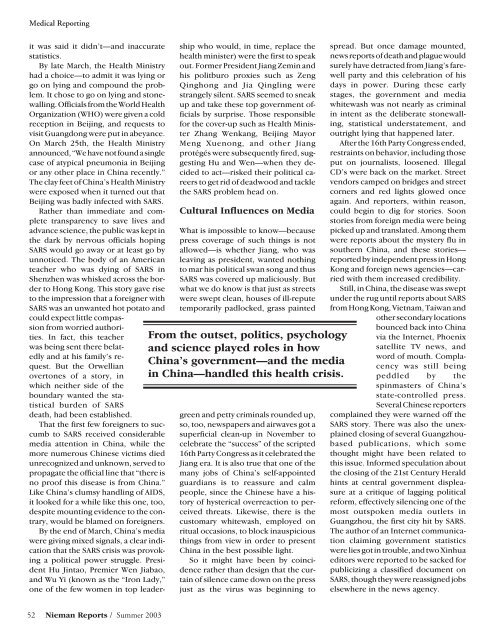summer-2003-Part 2-live - Nieman Foundation - Harvard University
summer-2003-Part 2-live - Nieman Foundation - Harvard University
summer-2003-Part 2-live - Nieman Foundation - Harvard University
- No tags were found...
Create successful ePaper yourself
Turn your PDF publications into a flip-book with our unique Google optimized e-Paper software.
Medical Reportingit was said it didn’t—and inaccuratestatistics.By late March, the Health Ministryhad a choice—to admit it was lying orgo on lying and compound the problem.It chose to go on lying and stonewalling.Officials from the World HealthOrganization (WHO) were given a coldreception in Beijing, and requests tovisit Guangdong were put in abeyance.On March 25th, the Health Ministryannounced, “We have not found a singlecase of atypical pneumonia in Beijingor any other place in China recently.”The clay feet of China’s Health Ministrywere exposed when it turned out thatBeijing was badly infected with SARS.Rather than immediate and completetransparency to save <strong>live</strong>s andadvance science, the public was kept inthe dark by nervous officials hopingSARS would go away or at least go byunnoticed. The body of an Americanteacher who was dying of SARS inShenzhen was whisked across the borderto Hong Kong. This story gave riseto the impression that a foreigner withSARS was an unwanted hot potato andcould expect little compassionfrom worried authorities.In fact, this teacherwas being sent there belatedlyand at his family’s request.But the Orwellianovertones of a story, inwhich neither side of theboundary wanted the statisticalburden of SARSdeath, had been established.That the first few foreigners to succumbto SARS received considerablemedia attention in China, while themore numerous Chinese victims diedunrecognized and unknown, served topropagate the official line that “there isno proof this disease is from China.”Like China’s clumsy handling of AIDS,it looked for a while like this one, too,despite mounting evidence to the contrary,would be blamed on foreigners.By the end of March, China’s mediawere giving mixed signals, a clear indicationthat the SARS crisis was provokinga political power struggle. PresidentHu Jintao, Premier Wen Jiabao,and Wu Yi (known as the “Iron Lady,”one of the few women in top leadershipwho would, in time, replace thehealth minister) were the first to speakout. Former President Jiang Zemin andhis politburo proxies such as ZengQinghong and Jia Qingling werestrangely silent. SARS seemed to sneakup and take these top government officialsby surprise. Those responsiblefor the cover-up such as Health MinisterZhang Wenkang, Beijing MayorMeng Xuenong, and other Jiangprotégés were subsequently fired, suggestingHu and Wen—when they decidedto act—risked their political careersto get rid of deadwood and tacklethe SARS problem head on.Cultural Influences on MediaWhat is impossible to know—becausepress coverage of such things is notallowed—is whether Jiang, who wasleaving as president, wanted nothingto mar his political swan song and thusSARS was covered up maliciously. Butwhat we do know is that just as streetswere swept clean, houses of ill-reputetemporarily padlocked, grass paintedFrom the outset, politics, psychologyand science played roles in howChina’s government—and the mediain China—handled this health crisis.green and petty criminals rounded up,so, too, newspapers and airwaves got asuperficial clean-up in November tocelebrate the “success” of the scripted16th <strong>Part</strong>y Congress as it celebrated theJiang era. It is also true that one of themany jobs of China’s self-appointedguardians is to reassure and calmpeople, since the Chinese have a historyof hysterical overreaction to perceivedthreats. Likewise, there is thecustomary whitewash, employed onritual occasions, to block inauspiciousthings from view in order to presentChina in the best possible light.So it might have been by coincidencerather than design that the curtainof silence came down on the pressjust as the virus was beginning tospread. But once damage mounted,news reports of death and plague wouldsurely have detracted from Jiang’s farewellparty and this celebration of hisdays in power. During these earlystages, the government and mediawhitewash was not nearly as criminalin intent as the deliberate stonewalling,statistical understatement, andoutright lying that happened later.After the 16th <strong>Part</strong>y Congress ended,restraints on behavior, including thoseput on journalists, loosened. IllegalCD’s were back on the market. Streetvendors camped on bridges and streetcorners and red lights glowed onceagain. And reporters, within reason,could begin to dig for stories. Soonstories from foreign media were beingpicked up and translated. Among themwere reports about the mystery flu insouthern China, and these stories—reported by independent press in HongKong and foreign news agencies—carriedwith them increased credibility.Still, in China, the disease was sweptunder the rug until reports about SARSfrom Hong Kong, Vietnam, Taiwan andother secondary locationsbounced back into Chinavia the Internet, Phoenixsatellite TV news, andword of mouth. Complacencywas still beingpeddled by thespinmasters of China’sstate-controlled press.Several Chinese reporterscomplained they were warned off theSARS story. There was also the unexplainedclosing of several Guangzhoubasedpublications, which somethought might have been related tothis issue. Informed speculation aboutthe closing of the 21st Century Heraldhints at central government displeasureat a critique of lagging politicalreform, effectively silencing one of themost outspoken media outlets inGuangzhou, the first city hit by SARS.The author of an Internet communicationclaiming government statisticswere lies got in trouble, and two Xinhuaeditors were reported to be sacked forpublicizing a classified document onSARS, though they were reassigned jobselsewhere in the news agency.52 <strong>Nieman</strong> Reports / Summer <strong>2003</strong>
















